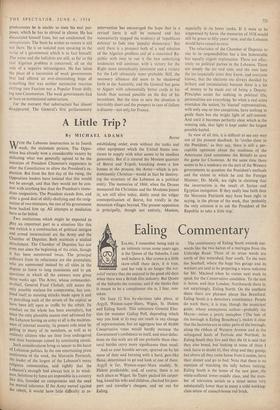A Little Trip ?
By MICHAEL ADAMS Beirut
WITH the Lebanon insurrection in its fourth week, the stalemate persists. The Oppo- sition has already won a considerable victory by defeating what was generally agreed to be the intention of President Chamoun's supporters to alter the Constitution to allow the President's re- election. But from the first day of the rising, the Opposition leaders have insisted that this would not be enough, and that they would not be con- tent with anything less than the President's imme- diate resignation. The President stands firm, and after a good deal of shilly-shallying and the resig- nation of two ministers, the rest of his government have backed him up. All attempts at mediation have so far failed.
Two institutions which might be expected to play an important part in a situation like this one (which is a combination of political intrigue and armed insurrection) are the Army and the Chamber of Deputies. Both maintain a studied detachment. The Chamber of Deputies has not even met since the beginning of the crisis, though it has been summoned twice. The principal sufferers from its reluctance are the journalists, who are summoned instead by all sides in the dispute to listen to long statements and to ask questions to which all the answers were given three weeks ago. The Army, whose commander- in-chief, General Fuad Chehab, still seems the Only possible nucleus for compromise, has con- fined itself to resisting attacks made upon it and to patrolling such of the streets of the capital as have been left open to traffic by the rebels. Its conduct on the whole has been exemplary, but since the only plausible reason ever advanced for the Lebanon having an army at all is the mainten- ance of internal security, its present role. must be galling to many of its members, as well as to ordinary citizens who see their lives endangered and their businesses ruined by continuing unrest.
Such considerations bring us nearer to the heart of Lebanese politics. In the one entertaining press conference of the week, the Maronite Patriarch, the leader of the largest of the Lebanon's many religious communities, said rightly that the Lebanon's strength had always lain in its weak- ness. Solutions by force are impossible in a country like this, founded on compromise and the need for mutual tolerance. If the Army moved against the rebels, it would have little difficulty in re- establishing order, even without the tanks and other equipment which the United States con- tinues to supply with what seems to be needless generosity. But if it cleared the Moslem quarters of Beirut and Tripoli, knocking down a few houses in the process, the Army—which is pre- dominantly Christian—would in fact be destroy- ing the structure of the Lebanon as a political entity. The memories of 1860, when the Druzes massacred the Christians and the Moslems joined in, are still alive today, dimly amid the vulgar cosmopolitanism of Beirut, but vividly in the mountain villages beyond. The present opposition is principally, though not entirely, Moslem, especially in its lower ranks. If it were to be suppressed by force, the memories of 1958 would still be green in fifty years' time, and the Lebanon would have ceased to exist.
The reluctance of the Chamber of Deputies to rise to its responsibilities has a less honourable but equally cogent explanation. There are effec- tively no political parties in the Lebanon. There are simply the ins and outs, and the outs hate the ins (especially since they know, and everyone knows, that the elections are always decided by bribery and intimidation) because there is a lot of money to be made out of being a Deputy. Principles count for nothing in political life; personalities are everything. So when a real crisis overtakes the nation, Its 'elected' representatives, with only one or two exceptions, have nothing to guide them but the bright light of self-interest. And until it becomes perfectly clear which is the winning side, that light is kept under the largest possible bushel.
In view of all this, it is difficult to see any way out of the present deadlock. In 'circles close to the President,' as they say, there is still a per- ceptible optimism about the readiness of the Americans (and sometimes the British) to save the game for Chamoun. At the same time there seems to be a tendency on the part of the Western governments to question the President's methods and the extent to which he and 'the Foreign Minister, Dr. Malik, are right in claiming that the insurrection is the result of Syrian and Egyptian instigation. If they really lose faith then the Maronite Patriarch may have been right in saying, in the phrase of the week, that 'probably the only solution is to ask the President of the Republic to take a little trip.'










































 Previous page
Previous page